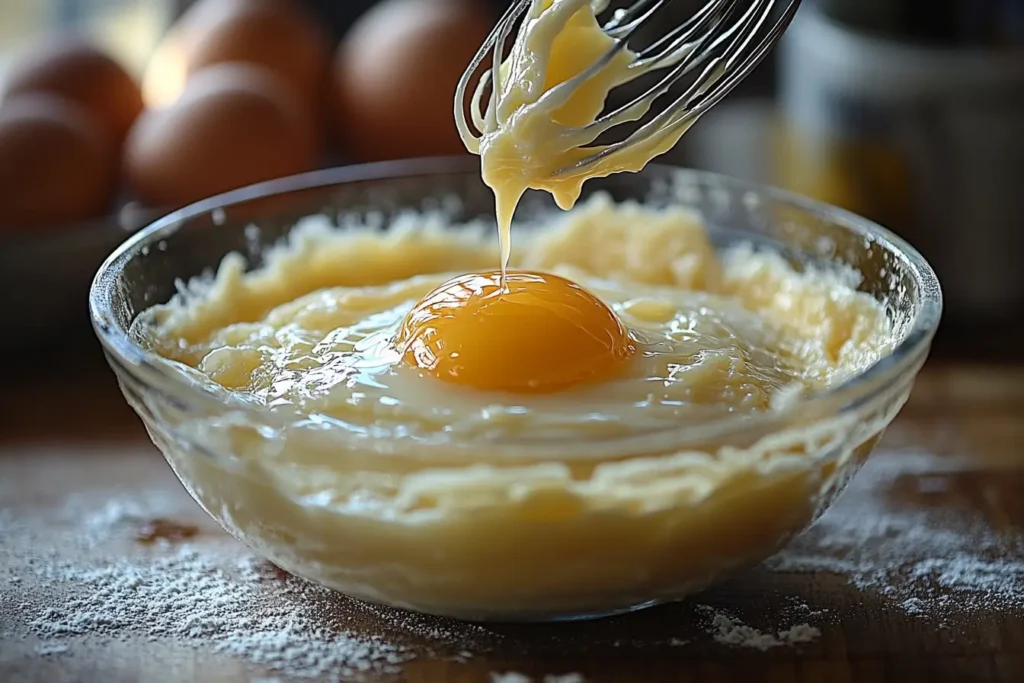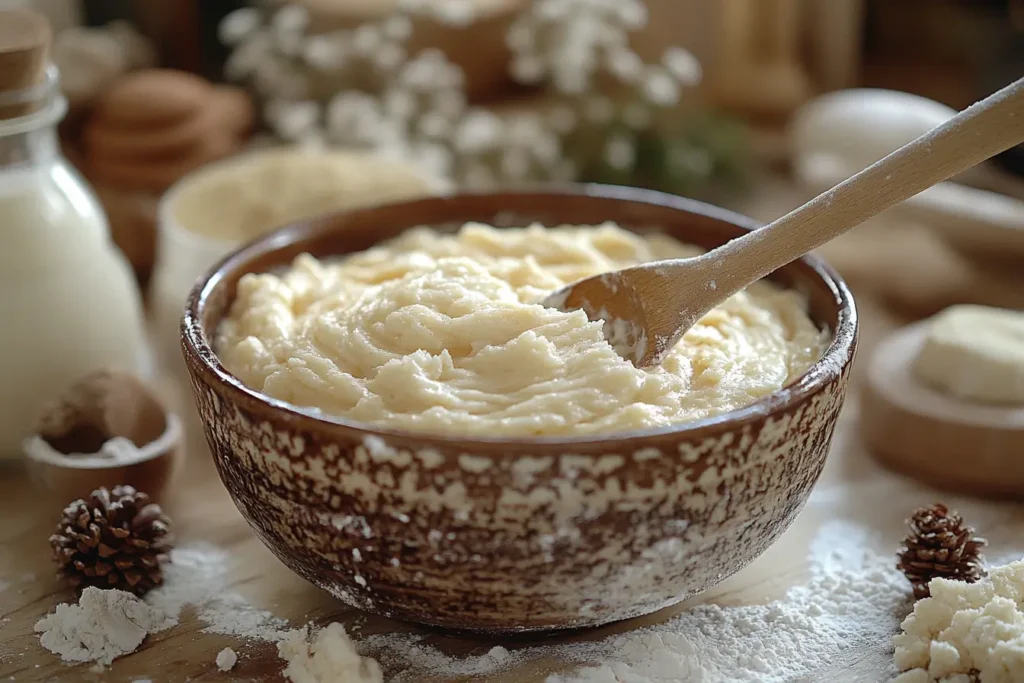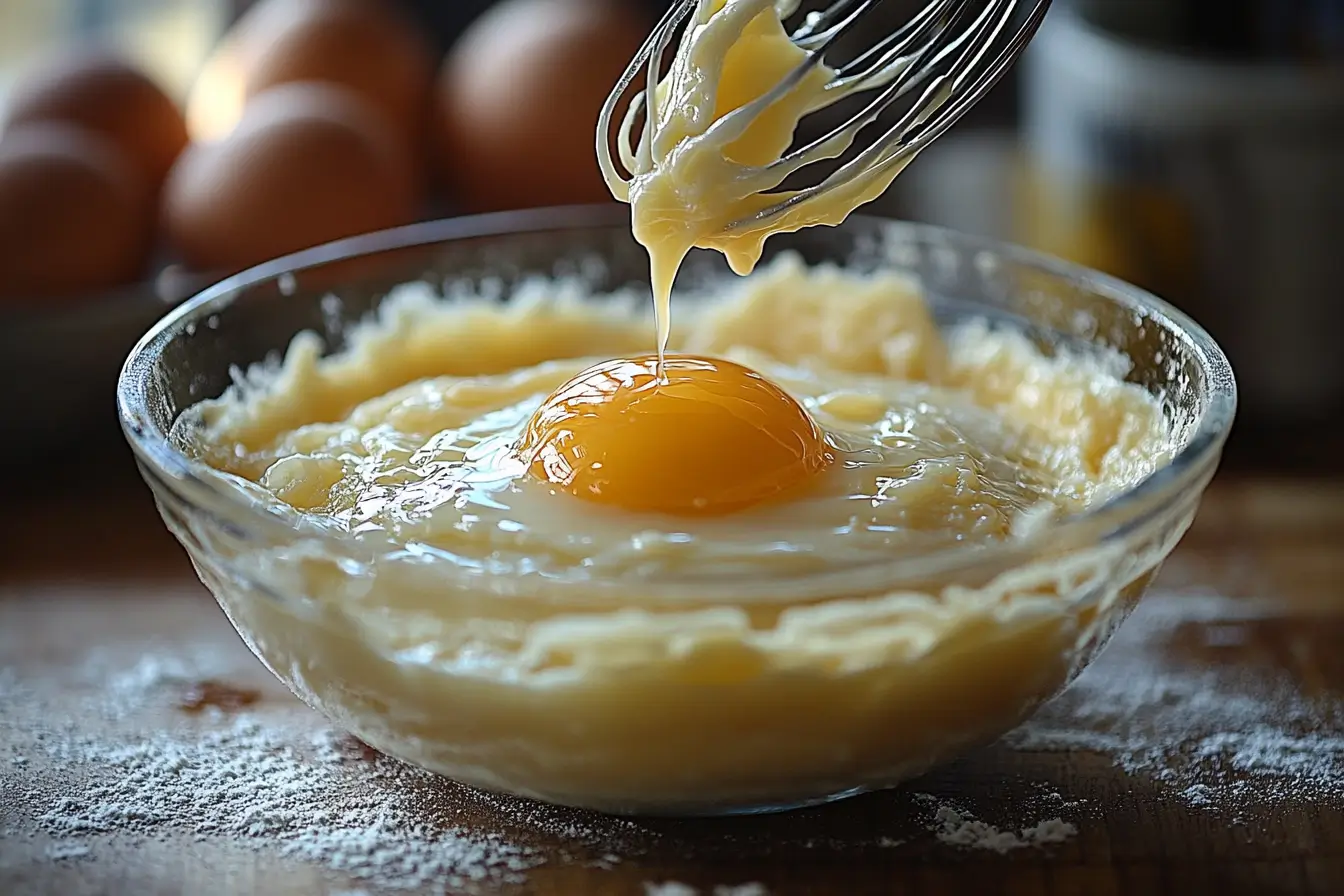
Pancakes are one of those magical breakfasts that can instantly turn a dull morning into a cozy, cheerful start. But what happens when you decide to experiment a bit—like adding an extra egg to your pancake mix? 🥞 Is it the secret ingredient to fluffy perfection or a recipe for disaster? Stick with me because we’re about to dive into the delicious science behind it.
Introduction: The Science Behind Pancake Mix Ingredients
Pancake mix may seem like a simple blend of flour, baking powder, sugar, and salt, but every ingredient plays its own role. Eggs, in particular, are essential—they’re like the glue that holds the magic together.
Eggs provide structure, moisture, and a subtle richness to pancakes. When you toss an extra egg into the mix, you’re not just adding another ingredient—you’re tinkering with the balance. And guess what? That balance can make or break your pancake game.
If you’ve ever wondered whether adding an extra egg makes pancakes fluffier, tastier, or simply better, you’re not alone. Let’s break it down.
The Role of Eggs in Pancake Batter
You can think of eggs as the multi-tasker in pancake batter. They play several roles that make pancakes rise, hold their shape, and taste heavenly.
What Do Eggs Add to Pancakes? (Texture, Flavor, Structure)
Eggs are like the architect of your pancakes. Here’s what they bring to the table:
- Structure: Eggs bind the ingredients together, giving pancakes a solid shape without being too dense.
- Flavor: Eggs add richness, which enhances the overall taste of pancakes. Ever tasted pancakes without eggs? They’re usually bland and lifeless.
- Moisture: The liquid part of the egg (the egg whites) keeps the batter moist. Without this, pancakes can feel dry and crumbly.
So, when you add an extra egg, it amplifies these benefits—but with a twist. Too much egg can shift the texture or flavor in unexpected ways.
How Eggs Interact with Other Ingredients in the Mix
Pancakes are all about chemistry. Eggs don’t just work on their own; they interact with the other ingredients in fascinating ways:
- With Flour: Eggs bind to the gluten in flour, helping pancakes hold their structure.
- With Baking Powder: Eggs trap air bubbles created by the baking powder, which makes the pancakes rise and fluff up.
- With Sugar: The fat in egg yolks balances the sweetness, creating a harmonious flavor profile.
This dynamic means even a slight change—like adding one extra egg—can tweak the entire pancake experience.
Adding an Extra Egg: What Changes in Pancakes?
So, what exactly happens when you add an extra egg to your pancake mix? Whether you’re aiming for fluffier pancakes or something richer, the results might surprise you.
Effect on Pancake Texture (Fluffier or Denser?)
Adding an extra egg can be a game-changer for pancake texture. Depending on how you like your pancakes, this might be a dream come true—or a slight disappointment.
- More Fluff: Eggs trap air bubbles during cooking, and extra eggs mean extra fluffiness. If your pancakes have felt flat or lifeless, adding another egg can breathe new life into them.
- Potential Density: On the flip side, too much egg can weigh down the batter, making pancakes slightly denser. If you like light-as-air pancakes, you might want to balance that extra egg with a splash of milk.

Impact on Pancake Flavor: Richer and More Eggy Taste
Ever had pancakes that tasted like scrambled eggs? That’s what happens when you add too much egg without adjusting other ingredients. However, one extra egg usually enhances the flavor by making it richer and more satisfying.
👉 If you love thick, decadent pancakes, an extra egg might be your golden ticket. But if you’re a fan of subtle flavors, tread carefully—too much egg can overpower the taste.
How Adding an Extra Egg Affects Moisture and Structure
Extra eggs equal extra moisture. The egg whites, in particular, keep pancakes moist and soft on the inside. But here’s the catch—this can also make the batter a bit runnier.
Quick Tip: If your batter feels too thin after adding an extra egg, balance it out by sprinkling in a little extra flour.
“Adding an extra egg is like giving your pancakes a turbo boost—more fluff, more flavor, but tread carefully because too much can throw things off balance.”
Common Reasons for Adding an Extra Egg to Pancake Mix
So, why do people add extra eggs to pancake mix in the first place? It’s usually for one of these reasons:
Achieving Thicker, Fluffier Pancakes
Some people live for tall, fluffy pancakes. Adding an extra egg can help achieve that Instagram-worthy thickness. It’s like giving your pancakes a little extra oomph.
Adjusting the Pancake Consistency for Waffles or Crepes
If you’re planning to make waffles or thin crepes with pancake mix, an extra egg can help:
- For Waffles: Extra eggs make waffles crispier on the outside and fluffier inside.
- For Crepes: The added moisture from an extra egg makes the batter smoother and easier to spread thin.
Personal Preferences for Taste and Texture
Sometimes, it’s all about preference. Some people like their pancakes light and delicate, while others love thick, eggy pancakes with a custard-like texture.
The beauty of cooking is that you can tweak recipes to suit your own tastes. If you’re curious, try adding an extra egg and see if it hits the sweet spot for you.
“Cooking is a delicious science experiment—adding an extra egg is just one way to discover your perfect pancake formula.”
Problems When Adding an Extra Egg to Pancake Mix
Now that we’ve talked about the benefits, let’s get real—adding an extra egg isn’t foolproof. It can sometimes lead to problems.
Pancakes Becoming Too Dense or Heavy
Adding an extra egg can make pancakes feel too thick or too heavy. This happens when the extra protein in the egg binds too tightly with the flour.
Overpowering Egg Flavor in the Pancakes
If you’re not a fan of strong egg flavors, adding an extra egg might not be for you. The richness can sometimes turn into an overpowering “scrambled egg” taste—especially if your batter is already egg-heavy.
Unbalanced Batter Consistency: Too Runny or Too Thick
Balance is key when adjusting pancake batter. An extra egg can make the batter runnier, which can be frustrating when you’re trying to get that perfect pour.
Solutions to Common Problems When Adding an Extra Egg
If you’ve run into issues like dense pancakes, overpowering egg flavor, or unbalanced batter, don’t worry—I’ve got you covered. The good news is that these problems are easy to fix with just a few tweaks. Let’s explore how you can strike the perfect balance when experimenting with that extra egg.
Balancing the Mix: Adjusting Other Ingredients

When you add an extra egg, you’re increasing the moisture, protein, and fat in your pancake batter. To balance this, adjust the other ingredients slightly
- Add a Splash of Milk: If the batter becomes too thick, add 1–2 tablespoons of milk. This will thin it out and make it easier to pour.
- Add a Bit More Flour: If your batter feels too runny, sprinkle in a teaspoon or two of flour. Go slow—you don’t want to overdo it.
- Adjust Baking Powder: A pinch more baking powder can add lift, counteracting any denseness caused by the egg.
👉 Think of it like tuning a guitar. Adding an egg changes the sound, so you need to tweak the strings (ingredients) to make it perfect. 🎸
Reducing Egg Flavor with Proper Flavor Additives
If you’re worried about your pancakes tasting too eggy, flavoring is your best friend. Here’s what you can do:
- Vanilla Extract: Add a teaspoon of vanilla extract for a sweet, aromatic flavor.
- Cinnamon or Nutmeg: These spices mask the strong egg flavor and give pancakes a cozy, warm taste.
- Sugar: A touch more sugar can balance out the richness of the egg.
- Lemon Zest or Orange Zest: These brighten the flavor, adding a refreshing twist.
“Cooking is like art. If one ingredient feels too loud, balance it with something softer or sweeter.”
Understanding the Ideal Ratio for Pancake Batter
When it comes to pancakes, ratios are everything. One egg is typically enough for every cup of pancake mix. Adding an extra egg can be wonderful, but don’t forget to balance it with the right amount of liquid and flour.
Here’s a quick adjustment guide if you’re adding an extra egg:
- 1 Cup Pancake Mix → 2 Eggs + ~1 Cup Milk
- Consistency Tip: The batter should be thick but still pourable—like heavy cream. If it’s too runny, add flour; too thick, add milk.
Experimenting with Extra Eggs: How to Customize Pancake Mix
The beauty of pancakes is that you can make them your own. Adding an extra egg isn’t just about fixing texture or flavor—it opens up possibilities for all sorts of pancake variations. Let’s look at a few fun ways to customize your batter.
Adding Extra Eggs for High-Protein Pancakes
Looking for a protein boost to fuel your day? Adding an extra egg is an easy way to turn pancakes into a high-protein breakfast without resorting to fancy supplements.
- Extra Protein Content: One egg has about 6 grams of protein, so tossing in an extra egg helps keep you full longer.
- Perfect for Fitness Lovers: Combine this with almond flour or protein powder for the ultimate protein-packed pancakes.
👉 Try adding some peanut butter or Greek yogurt as toppings for an extra protein punch. 💪
Making Egg-Based Pancake Variations (Dutch Baby, Crepes)
If you add an extra egg and adjust the liquid, you can turn basic pancakes into other delicious dishes:
- Dutch Baby Pancake: These oven-baked pancakes puff up like magic, thanks to the extra eggs. The result? A crispy, custard-like pancake that’s perfect with powdered sugar and berries.
- Crepes: Add an extra egg and increase the milk to create a thin, smooth batter. This gives you delicate, melt-in-your-mouth crepes that can be filled with anything from Nutella to savory cheese.
Trying Half an Extra Egg: A Step-by-Step Guide
What if you’re not sure whether you want to add a whole extra egg? Here’s a little trick: use half an egg!
- Crack one egg into a bowl and whisk it well.
- Measure out 2 tablespoons of the whisked egg. That’s about half an egg.
- Add it to your pancake mix.
This allows you to test small changes without overdoing it. Think of it as dipping your toes in the water instead of diving in headfirst.
“Pancakes are forgiving. Don’t be afraid to experiment—you might just discover your new favorite recipe!”
Real-Life Scenarios: When Adding an Extra Egg Works Best
Wondering when it’s actually a good idea to add an extra egg? Here are a few real-life situations where it can make a big difference:
Breakfast for a Crowd: Fluffier Pancakes to Impress
When you’re making pancakes for friends or family, you want them to be perfect—light, fluffy, and tall. Adding an extra egg helps make the pancakes rise beautifully, giving them that picture-perfect look.
Pro Tip: Pair the fluffiness with toppings like whipped cream and fresh fruit for maximum wow factor.
Special Diets: Protein-Enriched Pancakes for Fitness Enthusiasts
If you’re following a fitness routine or trying to add more protein to your diet, pancakes don’t have to be off-limits. Adding an extra egg boosts the protein content without changing the flavor too much.
Bonus Idea: Replace part of the flour with oats or almond flour for a healthier twist.
Quick Fix for Runny Pancake Batter
Have you ever poured pancake batter onto the griddle only to watch it spread like soup? Adding an extra egg can fix that. The egg will thicken the batter and help your pancakes hold their shape.
👉 Just be careful not to add too much; start small and adjust as needed.
Expert Tips for Perfect Pancakes with Extra Eggs
Before we wrap up this part, here are some quick expert tips to help you master pancakes with an extra egg:
Choosing the Right Eggs for Best Results
- Use large eggs—most recipes are based on this size.
- Fresh eggs work best because they trap air bubbles more effectively.
Testing Different Egg Sizes: Large vs. Medium Eggs
If you’re using medium eggs, you may need to add an extra splash of liquid to balance things out. Experiment and see which size gives you the best texture.
Mixing Techniques to Avoid Overworking the Batter
Overmixing pancake batter is a common mistake that leads to chewy pancakes. When adding an extra egg, mix just until the batter comes together—lumps are perfectly fine.
Frequently Asked Questions (FAQs)
Adding an extra egg to pancake mix might seem simple, but it often raises a lot of questions. Here are some of the most common queries, along with clear answers to help you nail your pancake game.
Can Adding an Extra Egg Ruin Pancakes?
Not necessarily, but it depends on your preferences. Adding an extra egg can make pancakes fluffier, richer, and slightly more eggy in flavor. However, if you overdo it, the batter can become dense or taste like scrambled eggs.
Tip: Start by adding just half an extra egg (2 tablespoons of whisked egg) and adjust based on your results.
How Many Eggs Should I Add for Fluffy Pancakes?
For most pancake recipes, 1 egg per cup of pancake mix is the standard. If you’re looking for fluffier pancakes, adding an extra egg works wonders—but make sure you balance it with enough liquid to avoid heaviness.
For those wanting something more hearty, consider trying a pancake breakfast casserole. It’s perfect for big breakfasts and combines everything you love about pancakes in one dish.
Can I Use Egg Substitutes When Adjusting the Mix?
Absolutely! If you’re allergic to eggs or following a plant-based diet, you can use egg substitutes. Some great alternatives include:
- Mashed Bananas: ¼ cup = 1 egg. Adds natural sweetness.
- Applesauce: ¼ cup unsweetened applesauce = 1 egg. Adds moisture without changing the flavor too much.
- Ground Flaxseed: Mix 1 tablespoon of flaxseed meal with 3 tablespoons of water = 1 egg. Works as a great binder.
If you’re experimenting, you can also explore other creative recipes like this perfect brookie recipe to mix up your breakfast routine.
Conclusion: Is Adding an Extra Egg Worth It?
So, after all this pancake talk, is adding an extra egg to your pancake mix worth it? The answer is: it depends on your goals!
- For Fluffier Pancakes: Yes! An extra egg traps more air, leading to fluffier, higher pancakes.
- For Richer Flavor: Definitely. If you enjoy a slightly richer, custard-like pancake, an extra egg is the perfect tweak.
- For Protein Boosts: Absolutely. An extra egg adds protein and turns your pancakes into a hearty, nutritious breakfast.
- For Personal Preference: Ultimately, pancakes are a blank canvas. Adding an extra egg lets you customize them to your heart’s desire.
“Adding an extra egg is like giving your pancakes a little secret superpower. It’s a small tweak with big potential—so why not give it a try?”

Final Thoughts and Tips for Perfect Pancakes
Pancakes are one of the simplest yet most satisfying breakfasts out there. The beauty lies in how customizable they are—you can tweak the recipe to match exactly what you’re craving.
If you’re curious about what adding an extra egg does, don’t be afraid to experiment! Start small, adjust other ingredients as needed, and have fun with it. After all, cooking is about finding what works for you.
Quick Recap of Tips:
- Balance the extra egg with a splash of milk or flour to maintain batter consistency.
- Add vanilla, cinnamon, or sugar to counteract any strong egg flavor.
- Use fresh, large eggs for the best results.
- For an ultra-fluffy texture, separate and whip the egg whites.
And there you have it! Next time you’re whipping up pancakes, feel free to experiment with an extra egg. Or, if you’re looking for other mouthwatering ideas, check out these unique recipes like Marry Me Chicken Pasta for dinner inspiration.
Happy cooking, and may your pancakes always be fluffy and delicious! 🥞✨

